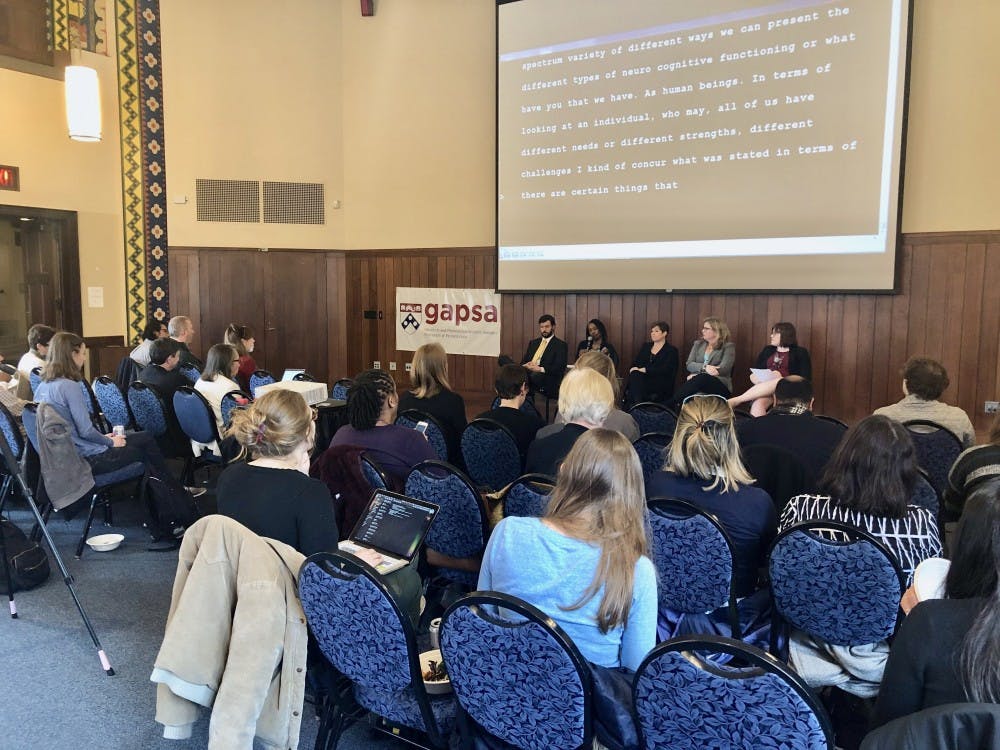
More than 30 people from across Penn and University City gathered at a panel about supporting graduate students with autism on Monday. The panelists, who are leaders in advocacy for autistic students, spoke about the discrimination autistic grad students face and the need for faculty to be better trained in supporting them.
Morénike Sheri Giwa, one of the panelists and a person with autism, spoke about how professors in her master's program were condescending towards her when she asked for clarification on vague instructions.
“It’s not intellectual ability, but all the other aspects I think that cause autistic students to feel demoralized in their graduate education," Giwa said.
The event, which was funded by the Graduate and Professional Student Assembly, included Giwa, who is the co-Executive Director of the Autistic Women and Nonbinary Network, Dean of the Georgia State University Law School Wendy Hensel, Director of Drexel Autism Support Program Amy Edwards, and Executive Director of Kinney Center Angus Murray.
“Resources available to graduate students who are disabled in general are not as robust as they should be,” said third-year political science Ph.D. student Heather Swadley, one of the event organizers.
Swadley added that while the resources at Penn's Office of Student Disabilities are compliant with the Americans with Disabilities Act, not many resources are geared toward educating faculty and students on supporting students with different disabilities.
The experiences of graduate students with autism is different from the experiences of undergraduate students because the role of the advisor in graduate study is more comparable to a manger in employment, Swadley said. Panelists also emphasized the importance of clear communication and open listening for students on the spectrum.
“I think just being a good, decent human-being goes a long way,” Murray said.
Fifth-year Physics Ph.D. student Rachael Creager, who was one of the organizers of the event, said she plans to create a document with suggestions from the event to send to Penn administrators.

Hensel said it is acceptable to be direct when communicating with autistic graduate students in uncomfortable situations.
“It’s OK to be blunt,” Hensel added. “You’re informing them of what made you uncomfortable.”
Swadley and Creager said they began organizing the event in September to address the lack of resources and attention given to neurodivergent and autistic graduate students.
Manuel de la Cruz Gutierrez, director of Data and Innovation Sciences at the Biomedical Library, said he came to the event to learn how he can help his family member with autism who is preparing to leave for college. The event also prompted him to consider how he can make the libraries a more “welcoming and inclusive” space.
Addye Susnick, a fellow at Repair the World Philadelphia, a nonprofit near Penn, said she attended the event to learn how to better support students when she begins teaching graduate school in the fall.
“It was particularly helpful for me to hear the different experiences of someone with the lived experience of being a student on the spectrum,” Susnick said. “I wanted to know what I can do to make sure all of my students are comfortable."
The Daily Pennsylvanian is an independent, student-run newspaper. Please consider making a donation to support the coverage that shapes the University. Your generosity ensures a future of strong journalism at Penn.
Donate




